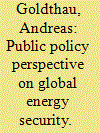| Srl | Item |
| 1 |
ID:
102546


|
|
|
|
|
| Publication |
2011.
|
| Summary/Abstract |
The global financial crisis that erupted in summer 2007 has made the reform of international prudential financial regulation one of the top priorities of global public policy. Past scholarship has usefully explained the creation and strengthening of international financial standards with reference to three policy arenas: interstate, domestic, and transnational. Despite the accomplishments of this specialist literature, the recent crisis has revealed a number of limitations in the ways scholars have understood interstate power relations, the influence of domestic politics, and the significance of transnational actors within international financial regulatory politics. Taken together, developments in each of these three arenas suggest that researchers may also need to be prepared to shift from explaining the strengthening of official international standards to analyzing their weakening in the postcrisis world. The latter task will require scholars to devote more analytical attention to a wider set of international regulatory outcomes, including "informal regulatory convergence," "regulatory fragmentation," and especially "cooperative regulatory decentralization."
|
|
|
|
|
|
|
|
|
|
|
|
|
|
|
|
| 2 |
ID:
113744


|
|
|
|
|
| Publication |
2012.
|
| Summary/Abstract |
Despite an emerging literature on global energy governance, there so far is no extensive intellectual rationale for it. This article seeks to fill this gap by putting forward a public policy framework to analyze global energy. With that lens, energy security relates to problems of market failure at a transnational scale. These may occur due to imperfect competition; negative externalities; lack of information; or the presence of public goods. It is argued that major global energy risks such as oil price volatility, lack of transport infrastructure, and insufficient upstream investments can be convincingly conceptionalized as markets failing to provide for a crucial good-energy security. This article thus proposes market failure as an analytical justification of and as an intellectual foundation for further research in global energy governance, and sketches possible research agendas in that field.
|
|
|
|
|
|
|
|
|
|
|
|
|
|
|
|
| 3 |
ID:
175398


|
|
|
|
|
| Summary/Abstract |
The secretariats of international organizations (international public administrations [IPA s]) constitute the institutional grid of global governance. While recent research has provided valuable insights into the independent capacities of international organizations (IO s) and the influence of IPA s, we lack systematic knowledge of how scholars conceptualize the preferences of IO staff. This is lamentable because understanding the (unifying) motivations of “international civil servants” helps us to make sense of their behavior and influence during the adoption and application of IO policies. To review how IPA studies conceptualize the preferences of international bureaucrats, this article suggests a fourfold typology of ideal-typical bureaucratic behavior. It distinguishes between the underlying behavioral logic and dominant bureaucratic goal orientation. Applying the typology to thirty-nine journal articles allows us to map IPA preferences and behavior, and shows that the literature predominantly views IPA s as behaving responsibly and less self-centeredly than could be expected from economic accounts of bureaucracy.
|
|
|
|
|
|
|
|
|
|
|
|
|
|
|
|